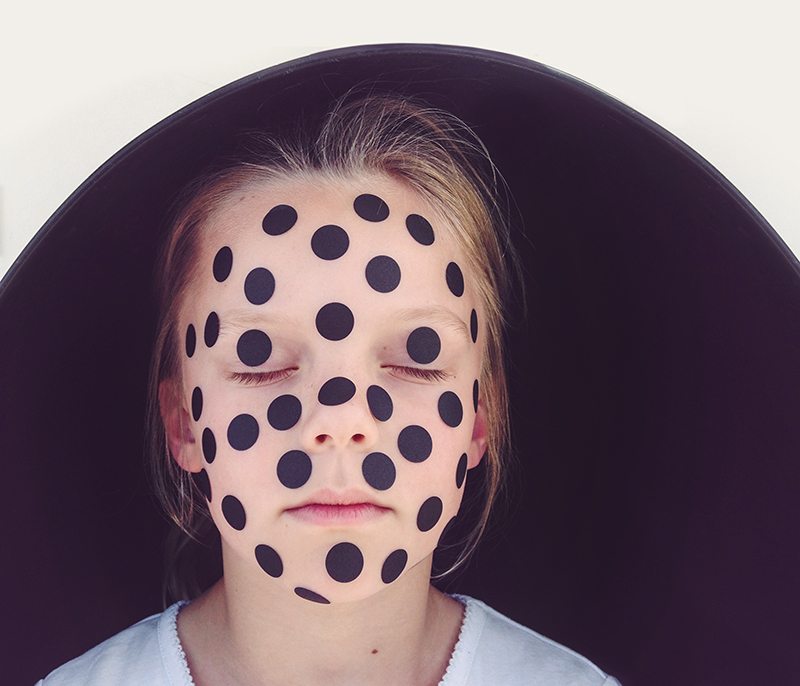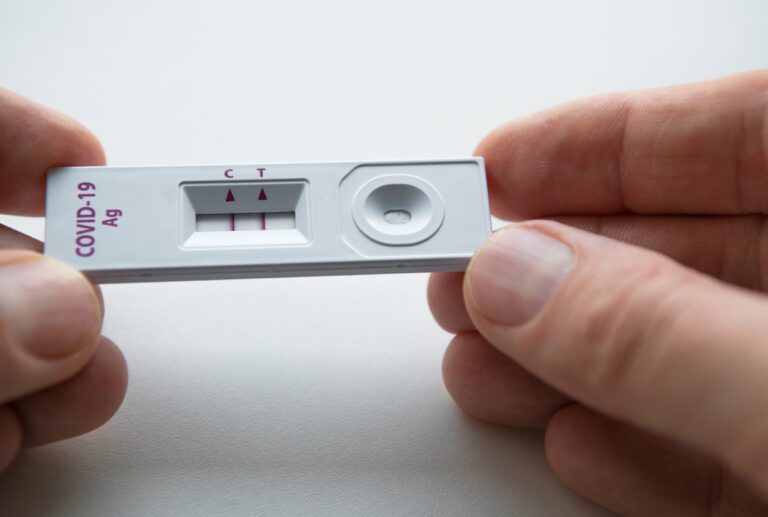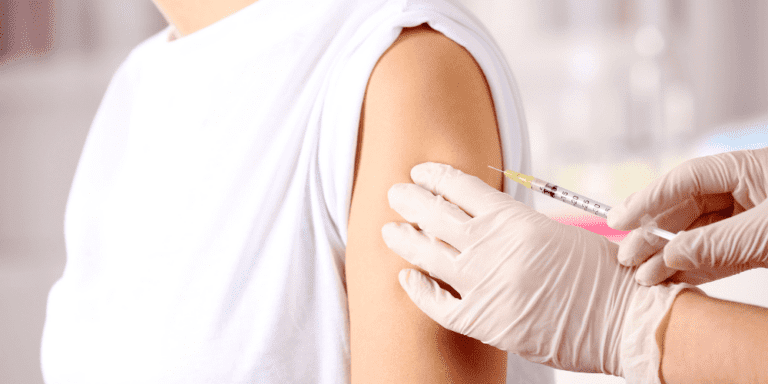Measles is the most common vaccine-preventable cause of death among children throughout the world, killing around 400 people every day despite an effective vaccine having been available for more than 50 years. It isn’t just the disease itself that is so serious; measles complications such as brain inflammation can be deadly or lead to permanent brain damage, blindness or deafness.
In many developed countries, immunisation rates are high enough that measles has been declared virtually “eliminated”, but a growing resistance against vaccinations and cases of the disease being imported from other countries means it is still dangerous.
Measles is so contagious that 90 per cent of people who aren’t immune to it will also become infected if they come close to someone who has it – it’s spread via coughs or sneezes and can live in the air or on surfaces for two hours after contact with an infected person.
Symptoms – fever, a runny nose, a cough and sore eyes – generally show up 10-14 days after exposure followed by a raised red rash about a week later.
New outbreaks
Measles dominated news headlines in the United States after an outbreak at Disneyland in December 2014. The US Centers for Disease Control and Prevention estimated that following the outbreak, more than 100 cases of measles spread across 14 states, including five babies at a daycare centre too young to be vaccinated. Last year, the US had 644 cases from 27 states, the most since 2000.
This led President Barack Obama to publically urge parents to vaccinate their children and Hillary Clinton to tweet her views on the matter to her 2.9 million followers: “The science is clear: the earth is round, the sky is blue, and vaccines work. Let’s protect all our kids.”
In Australia, measles is regularly imported by unvaccinated travellers, most recently a traveller returning from India and another returning from Europe. A baby too young to be fully immunised has since contracted the disease after coming into contact with the first of these travellers at a GP’s office.
In New Zealand, passengers who’d been on a flight from Kuala Lumpur to Auckland in February were advised to be vigilant for signs of infection after a fellow passenger was confirmed to have the disease.
Although the World Health Organization (WHO) hoped to eradicate measles by 2015, large-scale outbreaks in China, the Democratic Republic of Congo and Nigeria means the disease is far from under control. Measles outbreaks have also re-emerged in Georgia, Turkey and Ukraine. Almost 4000 cases have been identified in Europe over the past year and in less than five years, France went from having less than 100 cases a year to having more than 10,000 cases – and some deaths.
“Poor progress in increasing measles vaccination coverage has resulted in large outbreaks of this highly contagious disease, throwing the 2015 elimination targets off-track,” says WHO’s Dr Peter Strebel.
The number of deaths from measles increased from an estimated 122,000 in 2012 to 145,700 in 2013, with progress hampered by weak health systems, conflict and population displacement, as well as a drop in government funding for vaccination programmes. Last year 21.5 million children did not receive the measles vaccine, mostly in India, Nigeria, Pakistan and Ethiopia.
Herd immunity
The primary reason children are unvaccinated in Australia and New Zealand is because their parents don’t want them to be. The only way to avoid catching measles is to have two measles vaccinations, but parents can easily apply for an exemption.
Seth Mnookin, author of The Panic Virus: The True Story Behind the Vaccine-Autism Controversy (2011), argues that those who resist vaccinations rely on gut feel more than scientific evidence.
“Because the risks associated with foregoing vaccines feel so hypothetical, and because the infinitesimally remote possibility that vaccines could hurt our children is so scary, and because there’s nothing in our daily experience to indicate that a little fluid administered through a needle would protect us from a threat we can’t even see, it’s very hard for parents working by this intuition alone to know what’s best for their children,” he says.
Many who choose not to vaccinate argue, however, that they have made an informed decision based on their own research into the realities of vaccinations and their potential side effects, and should be free to make their own choices.
One of the reasons immunisation programmes have been so successful is because when enough people have been vaccinated against a particular disease, it can’t easily spread.
This “herd immunity” protects not only those who aren’t vaccinated by choice, but also those who are most vulnerable in a community – babies too young to be vaccinated, the elderly, and those with compromised immune systems such as people who have cancer, untreated HIV, or those who have just undergone a serious procedure such as a bone marrow transplant.
“It is like a herd of buffalo encircling its weakest members to protect them from predators,” Mnookin says.
The rates of immunisation required for effective herd immunity vary according to the disease. Professor Peter McIntyre, director of Australia’s National Centre for Immunisation Research and Surveillance of Vaccine Preventable Diseases, says a disease such as measles that spreads very quickly needs about 95 per cent of a population to be vaccinated to provide effective herd immunity (Australia and New Zealand have infant immunisation rates of 94 and 92 per cent, respectively).
“If you eradicate the disease you protect everyone, but short of total eradication you never quite eliminate the risk,” McIntyre says.
Freedom of choice
In Australia and New Zealand, about 70 per cent of people vaccinate without question, McIntyre says. Others seek more information before making a decision and about five per cent are fundamentally against it.
Australian mother of three Carla*, who now lives in Auckland, delayed immunising her first two children by a year and has not yet immunised her third, now aged three. Her choice came down to wanting her children to develop stronger immune systems before subjecting them to vaccinations.
“I had heard all these things and didn’t really trust that we needed all those injections,” she says. “I think people vaccinate because they’re scared and they’re worried, but I don’t really trust the drug companies; I feel they are pushing their products and that the healthcare system deals with a blanket coverage of something but the chances of children actually getting something are pretty slim.”
Carla’s youngest child did get whooping cough, but her children have otherwise been healthy. “I know for a lot of mums around me, it would never enter their minds not to have immunisations done, and they probably think I’m crazy, but all the doctors I’ve seen have said ‘Well, that’s your choice’ and as long as they feel like I’m informed they’re happy with that.”
Perth mother Jacqui* decided to vaccinate her two-year-old son homeopathically. Her initial reluctance to have him immunised stemmed from the experience her sister-in-law had with her son’s “full-on” behaviour after vaccinations. Jacqui’s chiropractor added further weight to her decision by sharing that he didn’t vaccinate his own children, and she read widely on the topic.
“I did as much research as I could, it’s an ongoing thing. I still think at this point we’ve done the right thing. He has a really strong immune system.”
With information (and misinformation) so readily available on the internet, and social networking making the spread of anecdotal corroboration so quick, anyone concerned that their child has reacted negatively to a vaccine can easily find “evidence” to back up their suspicions.
Sowing mistrust
In 1998, UK surgeon and medical researcher Andrew Wakefield published a paper in respected medical journal The Lancet, suggesting a link between the MMR (measles, mumps and rubella) vaccine and autism spectrum disorder (ASD). The study generated widespread media attention, parents posted their observations online and support groups formed. Vaccination rates soon tumbled and measles cases (and deaths) soared.
Subsequent studies could not replicate Wakefield’s results and a decade of research cleared MMR of any connection to ASD. It also came to light that Wakefield was being paid as an expert by lawyers who were suing over alleged vaccine injury.
Wakefield was struck off the medical register in the UK and the paper was formally retracted by The Lancet in 2010 after an investigation found the research to be fraudulent and misleading, but the damage had been done – some still think there may be an autism-vaccination link.
“It’s very hard to put the genie back in the bottle,” McIntyre says. There is a tendency in some circles, he adds, to accuse everyone who has anything to do with vaccines of trying to make money out of them and of withholding their real risks.
“Nothing could be further from the truth than that,” he says. “I think everyone who is involved with giving vaccines is as keen as parents who are being advised to receive them that they get the best outcome both in terms of preventing what they’re targeting and not getting unwanted side effects.”







